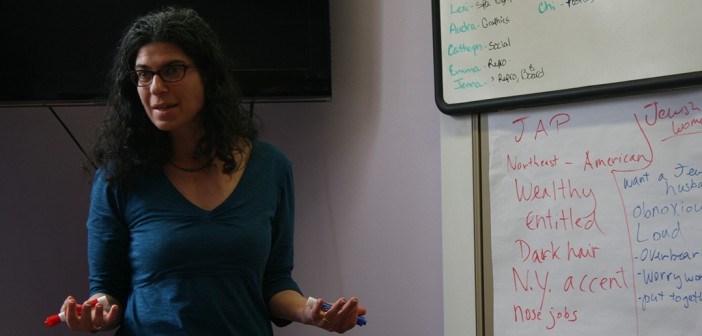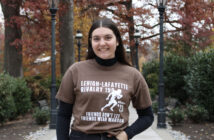Wealthy, entitled, dark hair and nose jobs are just a few of the connotations mentioned by participants when asked about “JAP,” or “Jewish American Princess,” stereotypes at the Women Center’s “Jewish American Princess: Past, Present and Future” discussion Tuesday.
A major theme throughout the talk was current and conventional JAP stereotypes. Rabbi Danielle Stillman, Director of Jewish Life, said the history of the stereotype is negative. The idea is that JAPs can’t do anything for themselves and rely on males for everything. They were depicted as sexually withholding and selfish.
“Jewish women have traditionally been a blank canvas for the anxieties both of the majority culture in America, and also the Jews themselves who are anxious about their place in America,” Rabbi Stillman said.
Challenging the notion that stereotypes are rooted in truth, Rabbi Stillman said that in reality, the list of JAP-related words that the group had complied aren’t very specific to solely Jewish women.
“It’s a group of different characteristics that have been lumped together but certainly there are other ethnic groups that are wealthy, entitled, want to marry someone of their own religion or want their children to do well,” she said. “There’s nothing particularly Jewish about any of that. It seems like there may be some truth in these stereotypes but there’s nothing that links them particularly to that group.”
The meaning behind the term JAP is potentially changing in the 21st century.
“There is a bit of an evolution of the stereotype and people are embracing it, which may be why people feel comfortable with it,” she said. “But the history behind the word is still very important to understand.”
“The Jewish women I have hung out with seem to use the term a lot, so it seems like they’re ok with it,” Emily Prendergast, ’15, said. “They kind of embrace it and they don’t make it seem like it’s a negative stereotype.”
This evolution is demonstrated on the HBO series “Girls.” Stillman played a clip of Shoshanna who is a character that can be classified as a JAP because of her religion and spoiled lifestyle. In the first season, Shoshanna is on a mission to lose her virginity.
“The stereotype is evolving because traditionally JAPs are not interested in sex, and now Shoshanna is representing someone who really wants that as part of her life,” Stillman said. “It’s interesting that the show itself uses the stereotype but is also questioning it a little bit.”
Rabbi Stillman also told the story of Jewish women coming to America in the early 1900s who worked in garment factories. They often faced adversity from other Americans and even upper class Jews as they struggled to obtain middle class status.
The dialogue about the struggle for the American dream was followed by a connection to women on a more general scale.
“The classification of Jewish American Princesses is a way to contain women with appetite, whatever appetite that is,” said Rita Jones, Director of the Women’s Center. “Women are punished for wanting whatever it is they want so they get critiqued for it. Even though that’s the American dream that everyone is supposed to want.”
A YouTube video called “Hebrew Mantra” was also featured during the discussion. The clip shows a poetry performance of a Jewish woman who felt the victimization of stereotyping. In her performance, the woman discusses the harm of responding to a person’s identity in a surprising or negative manner.
“I really liked how she closed it out by saying that when people say you’re not your people — How is that true?” Alex Donnelly, ’16, said. “You are your person. I think that’s profound for not only Jewish American Princess terminology but just for any type of identity.”






Comment policy
Comments posted to The Brown and White website are reviewed by a moderator before being approved. Incendiary speech or harassing language, including comments targeted at individuals, may be deemed unacceptable and not published. Spam and other soliciting will also be declined.
The Brown and White also reserves the right to not publish entirely anonymous comments.